No More Cliché!
_Collaborating with and Casting Foreign Performers ①
Kim Il-Song (editor-in-chief of TheApro)
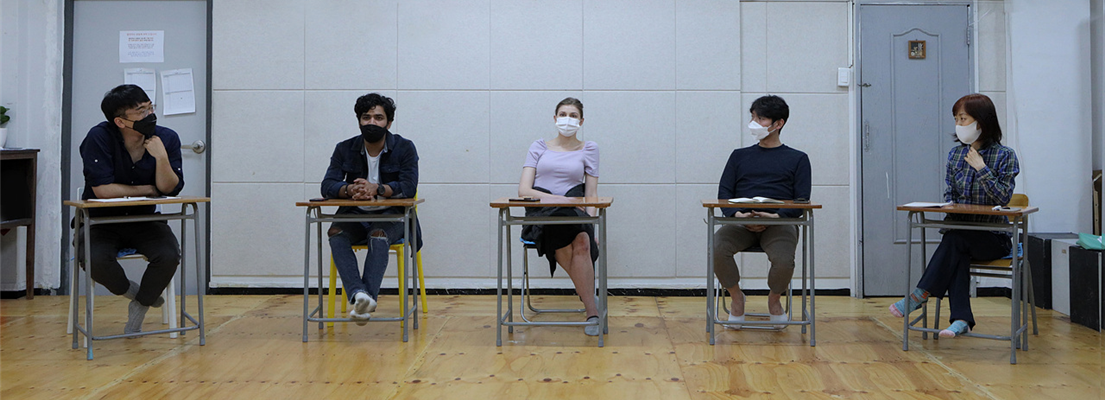
@KIM SeungHwan
| Moderator |
Kim Il-Song (editor-in-chief of TheApro) |
| Participants |
Kang HoonGu (director / representative of the Ball Play Club) |
| Anupam Tripathi (performer) |
| Anna Elisabeth Rihlmann (performer) |
| Lee JunYoung (performer) |
| Choi ZinA (director / representative of the Theater group Nolddang) |
| Date / Time |
May 24, 2021 / 18:00~20:00 |
| Venue |
Rehearsal room of the Theater group Nolddang |
In April 2021, British weekly magazine released a special series of articles about race-related issues. In one of the articles, Ghanaian actor Emmanuel Kojo asked this question: “Why do some feel so uncomfortable seeing non-white faces in traditionally white roles?” He then suggested sharing different discourses to resolve issues concerning racial discrimination. In another article entitled “Race and Theater Reviews,” provided guidelines for theater critics to follow when their reviews include race-related content. Most of the guidelines are fully predictable with a common sense. But one of the many sentences in the guidelines is especially worth noting:
“Avoid referring to immutable characteristics such as age, race, gender and appearance unless such characteristics directly affect the production’s meaning.”
In this regard, TheApro had a round-table talk about race. Considering the fact that the Korean performing arts scene still doesn’t have many cases of raising racial issues, the scope of talk has been narrowed down to “things to take note of when collaborating with foreign performers.” The talk had the following particpants: director Choi ZinA from the Theater group Nolddang who has recently directed the play about refugees , Lee JunYoung who performed in the play, director Kang HoonGu from the Ball Play Club who is currently preparing for the play with foreign performers and last but not least, Anna Elisabeth Rihlmann and Anupam Tripathi, who are performering in the play. The talk will be shared in a series of two articles.
| Il-Song |
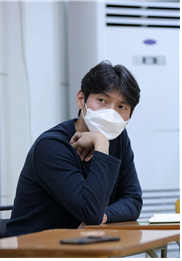
Lee JunYoung
@KIM SeungHwan
about race. Believing that such a discussion could also take place in
Korea, we prepared this talk with directors who have collaborated
with foreign performers as well as foreign performers staying in Korea.
The discussion will be divided into the following phases: first, casting,
second, rehearsing and third, the actual performance. I would like you
to talk about things you reflect on or take note of for each phase.
What you share here would be helpful for other directors who are
planning to collaborate with foreign performers. It will also provide
those in the performing arts scene including critics with food for
thought.
I’m Kang HoonGu, director of the Ball Play Club. I’m currently preparing for with the two foreign performers who are here with us.
I’m Anupam Tripathi. I’m from India and I’m performing in .
I’m Anna Elisabeth Rihlmann, an actress from Germany. It has been seven years since I came to Korea. I’m currently playing in and preparing for .
I’m Lee JunYoung, an actor of the Theater group Nolddang. I performed in , a play about refugees.
I’m Choi ZinA, a writer and director. |
| HoonGu |
| Anupam |
| Anna |
| JunYoung |
| ZinA |
Korean Society’s Transition to a Multiethnic Society
| Il-Song |
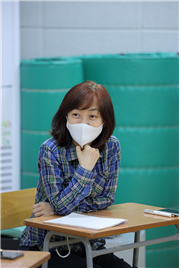
Choi ZinA
@KIM SeungHwan
Korean performances only cast Koreans while many foreigners live in Korea. So I thought that Korean performers were monopolizing the stage. That is why I wanted to be on stage with foreigners. I wanted to mingle with them.
Watching translated performances, I found it very regrettable for Koreans to imitate foreigners. Even five years ago, Korean performers put on a white or black makeup in many plays to look like foreigners. Watching those plays, I found it not just “strange“ but “problematic.“ So I thought that instead of doing that, it would be great to work with foreigners because many foreigners live in Korea. But it was difficult to find foreign performers. I had never worked with them so it was all the more challenging. I don’t have much experience but when foreign performers are on stage, their very existence widens the spectrum of the performance in some way. So I’m having a great time working with them.
All this seems to have started from the fact that many foreigners live in Korea. In the past, Korean plays only talked about Koreans but these days, not only translated performances but also creative ones tell stories of living with foreigners. There is such a background in Korean society, which has led us to reflect on living with foreigners in Korean society. As someone producing plays, I wanted to tell such stories. |
| ZinA |
| HoonGu |
| ZinA |
It Is Hard to Get a Visa for Artists, Even for Professional Artists
| Il-Song |
HoonGu, you have just talked about your challenges. What would be the challenges other than the fact that it is difficult to find foreign performers?
Many of them aren’t available for collaboration. As for full-time performers, they are working in the media like TV so they don’t have much time to perform in plays. They have many advertisements, TV series and films to work on so they don’ t have time for plays. In the case of those who are not performers, they don’t have time to perform in plays either because they have to work on weekdays. And there is also a problem which is not so simple. That is, when we pay them for their performance, there are many difficulties caused by their visa problem. Sometimes, we can’t pay those who have a student visa.
I know other foreigners who want to perform. Many of them don’t understand what they need to invest to perform in plays. And I believe that it is dangerous to cast those who haven’t been trained as actors. So the director should keep these things in mind. In some cases, directors are disappointed after suggesting working with foreigners and starting the collaboration.
Many foreigners appear in the media like TV and films but not on stage. That would be because of their income. If you work part time in the media, you can earn a certain amount of money for the day. But that is not the case for plays. And it takes time to perform in plays. That would be why not many foreigners can afford to appear in plays even if they want to.
|
| HoonGu |
| Anna |
| Anupam |
| Il-Song |
HoonGu has just mentioned the visa issue. Can’t you get paid if you are staying in Korea with a student visa?
It’s difficult. As a foreigner, it is actually a sensitive issue to talk about because it is about foreigners’ entry into Korea. If you are staying in Korea with a student visa, you can’t work more than a certain amount of time and if you work, you must report it. But it’s even not easy to report it.
When I was going to school, I came to appear in a performance at Doosan Art Center as my external project. On that occasion, I applied for a visa for artists. But it is difficult to apply for it as an individual. So I applied for it through a theater company and went to Korea Immigration Service for that. But they seemed to have a dim view of me. Back in those days, I was studying the arts at Korea National University of Arts. Those at the immigration office kept asking me strange questions, suspecting that I, a woman, would do something strange like sex trafficking. It was too fearsome and tough to stand it alone. And they didn’t know much about a visa for artists. They just said that I couldn’t change my status from a “student” to an “artist.” As they bombarded me with questions, I felt that they were looking down on me.
Working at a theater company, I had a similar experience. I’m a professional artist but those at the immigration office also asked me strange questions. So me too, I felt that they were looking down on me. But whenever I’m sitting in that office, I stiffen even if I haven’t done anything wrong. It is difficult to get a visa and if you get one, the period if short. The period of the visa is just from the first rehearsal day to the performance day. So at the end of a performance, you need to get another visa.
|
| Anupam |
| Anna |
| Anupam |
| Anna |
In the immigration office, I lose confidence because everything depends on those who are there. Even if I want to talk about my problems, I can’t because if they don’t like it, they may kick me out of Korea. There is always such a fear. Even though I’m fluent in Korean, they still have an attitude of looking down on me. The civil servants there talk down to me, saying, “Do you understand me?“ “Did you take a test?“ I always burst into tears when they say things like that.
Anupam, you said that a foreigner can’t work more than a certain amount of time in Korea. Then is it also true that they can’t earn money more than a certain amount? Of course, the pay from plays is very small...
That’s right. They can’t earn more than a certain amount.
And however small it is, you need to report the amount you earn. If you don’t, your penalty would exceed your pay from the performance.
|
| Il-Song |
| Anupam |
| Anna |
| HoonGu |
I have many foreign friends and when they graduate, they are worried about their visa. I hear many of them talk about this problem desperately. They say that it is really difficult to get a visa for artists, especially for Asians, even if they have lots of experiences in their career as artists.
Then have you ever failed to get paid for your performance because of such procedural problems?
No, I haven’t. There are people and agencies who try to solve those problems no matter what, even though the agencies get a large portion of my pay. They say they take it away because they help me solve problems regarding my visa and pay.
A friend of mine came to join an agency for models and she has to pay 2 million won every year. And after she works, the agency takes away 60% of her pay and she gets only 40% of it. She has no choice because she can’t stay in Korea if she doesn’t work that way.
That is why I want to work a lot so I could cast myself. |
| Il-Song |
| Anupam |
| Anna |
| Anupam |
Foreign Daughter-in-law, foreign worker
| Il-Song |
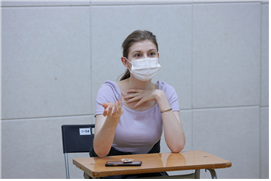
Anna Elisabeth Rihlmann
@KIM SeungHwan
I don’t think so but I heard many people say, “The only role available for you is a foreign daughter-in-law.” I felt so bad because I’m optimistic but people keep saying things like that. So I told them that I would never play the role of a foreign daughter-in-law. Fortunately, I joined a good theater company and talked about Germans a lot to be able to perform on stage. So I’m thankful. I also want to play the role of a Korean but I don’t have that chance often. Fortunately, the main character of the performance I’m preparing for () is Korean and I’m playing the role of a mother called Jocasta. I believe that it’s amazing to cast a foreigner for that role.
I’m Indian so I have limited roles to play, like a dead body, foreign worker and foreigner fluent in Korea. That’s about it.
What you said reminds me of some representative performances casting foreigners like the musical and Nolddang’s play . The performances seem to have a certain fixed way of casting foreigners. That is, foreigners in these works play the roles of foreign workers or refugees.
That is because the Korean media describes foreigners that way. Even students’ short films don’t have any different stories. They describe Asians as illegal aliens. That may be a cliché. I recently appeared in a TV series which seems to gather together such foreign workers. As an actor, I need to show something new so people can recognize me as a performer. That’s so tough! But I think it will take some time. It will takes some time for Koreans.
Have you ever played roles other than the “cliché” you are talking about?
|
| Anna |
| Anupam |
| Il-Song |
| Anupam |
| HoonGu |
| Anupam |
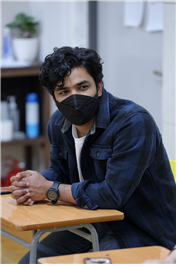
Anupam Tripathi
@KIM SeungHwan
I said that I wouldn’t paly the role of a foreign daughter-in-law but three years ago, I did play that role in the play . But I really liked that role. I participated in the activities of Seoul Council of Migrants for three years. There, I met many women from different countries like Vietnam and Iran. They often told me about the challenges they had gone through. When I played the role of a migrant woman on stage, they came to see my performance. And they said, “We relate to your performance because that’s our story. Thank you.“ So it was a very meaningful performance. I also believe that I should play other roles as well so I’m preparing another work with Anupam. It’s called . I have wanted to perform so I have been doing workshops since last year. You know, Korean performers are often cast as foreigners. So there is no reason why a foreigner couldn’t play the role of a Korean.
|
| Anna |
| HoonGu |
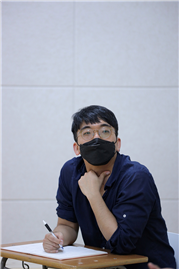
Kang HoonGu
@KIM SeungHwan |
According to the “2019 Local Governments’ Current State of Foreign Residents,” which was published by Korea’s Ministry of the Interior and Safety in 2020, the number of foreign residents in Korea is 2,216,612 regardless of whether they have obtained Korean citizenship or not. It accounts for 4.3% of the country’s population. Adding foreign students, sojourners and unregistered foreigners to this number, foreigners would account for 5% in Korea, In other words, the country has become a multiethnic society. But how good is Koreans’ understanding of foreigners? And how is their awareness of them? Above all, how is the progress that has been made for the country’s policies on foreigners? The story will continue in part two with how the performers rehearse after being cast.














 PREV
PREV
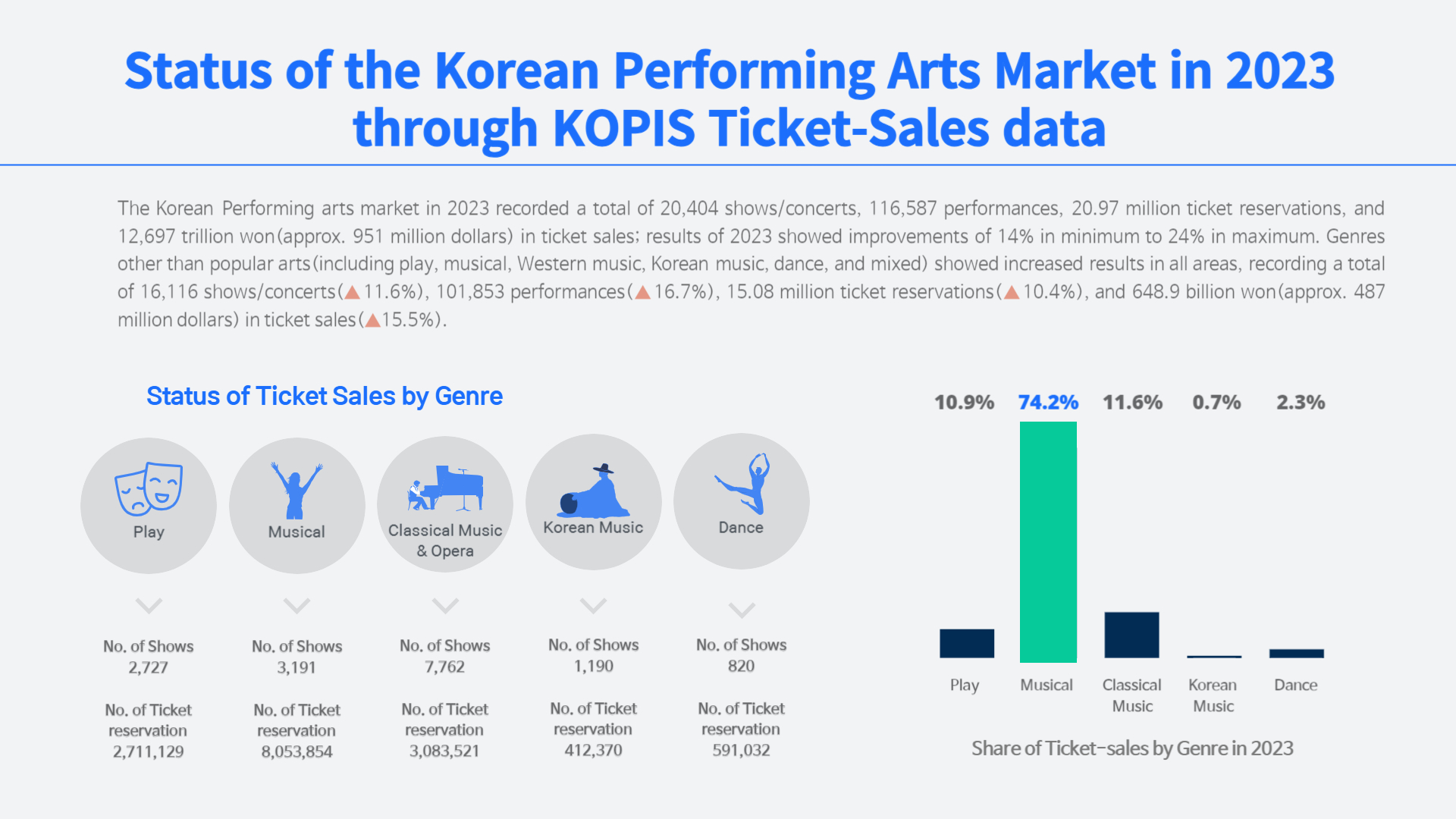
.jpg)
.jpg)
.jpg)
.jpg)











